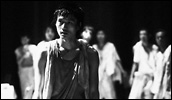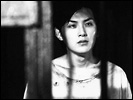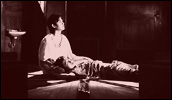Big Bang Love, Juvenile A
- Year
- 2006
- Original title
- 46-oku Nen no Koi
- Japanese title
- 46億年の恋
- Director
- Cast
- Running time
- 85 minutes
- Published
- 3 May 2006



by Tom Mes
A hand with a clapperboard appears from behind a wall. In half-light, Kenichi Endo commences a monologue, recited from several pages. A burst of red. A one-man dance performance accompanies a mentor's words that start a young boy's rite of passage. The boy grows up, masculinity with the angelic face of Masanobu Ando. He can crush prison thugs and shelter a no less angelic Ryuhei Matsuda. Around him, walled-in like in a pressure cooker, a confused, all-male concoction of desire, perversion, violence and loneliness. Authority is rigid, ghost-like, and lost in memories. Outside the walls, a rocket impatiently awaits the countdown to blast-off and endless steps lead to the top of a Mayan pyramid.
Going on his 70th film, Takashi Miike is still capable of surprising even his most loyal fans. Far from reaching critical consensus (and thank god for that), he continues to beat his own unique path. If at one moment he seems to be heading for blockbuster glory with films like Zebraman, One Missed Call and the as-blockbusting-as-it-gets The Great Yokai War, out of left field he suddenly appears to alienate the Asia Extreme crowd with the unclassifiable philosophical mood piece Izo. More than a mere chaser, Big Bang Love, Juvenile A continues where Izo left off, with an overtly homoerotic, Brechtian prison drama whose barely-lit concrete corridors echo whispers of Caligari, von Trier, and Godard.
"Godard?" I hear you say. As obligatory and unimaginative a cinematic reference point as the Swiss iconoclast-turned-disillusioned hermit may be, the comparison is justified in Miike's case. And it stretches back several years. Deconstruction has been a Miike trademark for a long time, reaching early heights in films like Dead or Alive and its two sequels, and especially in the vastly underrated Deadly Outlaw: Rekka, which took a story about Riki Takeuchi blowing up a skyscraper and turned it into a marvellously intricate meditation on storytelling, performance and playacting.
There is a lot of meditation in Big Bang Love, Juvenile A too. Despite being essentially a V-cinema production, it's perhaps one of Miike's most meditative films ever. This is odd on the one hand, because it was produced by Hisao Maki, responsible for Silver, Family and several other of the most thick-headed turkeys in Miike's career. On the other hand, this is not so odd at all, since the film was scripted by the great Masaru Nakamura, writer of Dead or Alive 2, The Bird People in China, Young Thugs: Nostalgia and several other of the very finest films in that same career. The big bang of the title is also the clash between the two furthest extremes in Miike's filmography and the spectacle of its scattering stardust is one to behold.
Yes, but is it any good? This is a Takashi Miike film. It will make you wonder, curse, marvel, tremble, scratch your head, grow bored, and awaken rudely. Celebrate it.